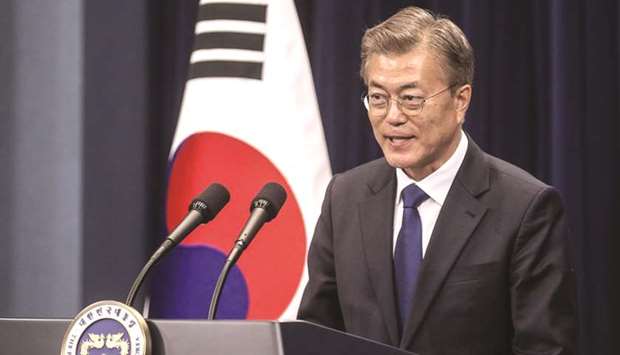Moon Jae-in began his second full year as South Korea’s president with a reminder of what didn’t work in the first – namely his economic policies.
The message came in an unusually blunt question from a local television reporter, who used Moon’s New Year’s news briefing Thursday to ask why he stuck with an agenda that appeared to be failing.
The president dug in, saying he needed to better persuade South Koreans his policies were right, not change course.
“I’ve explained why we need our government’s economic policy basis, and why it’s impossible to have sustainable growth without changing the imbalanced structure of our polarised society,” Moon said. “So, I don’t think I need to reply with a new answer.”
The episode underscored how South Korea’s slowing economy has emerged as a political liability for Moon, even as he’s enjoyed the global spotlight from playing peacemaker between US President Donald Trump and North Korean leader Kim Jong Un.
The self-styled “jobs president” has seen his once-sky-high poll numbers tumble, raising the prospect that he could face the same popularity problems that dogged his predecessors.
Moon, a progressive, was swept into office in 2017 promising a reversal from the conglomerate-focused economic agenda of ousted President Park Geun-hye. But his plan to raise the minimum wage 11% disappointed both workers who didn’t think it was enough and businesses who said it stifled growth.
More than three-quarters of the 30 experts surveyed by Bloomberg News last month predicted that employment growth would slow this year, in part because of the wage hike.
Moon axed his finance minister and his policy chief after criticism that his administration was sending mixed signals on the policy.
Choi Pae-kun, an economics professor at Konkuk University in Seoul, said that the president and his lieutenants weren’t considering how their wage moves hurt their related push to encourage entrepreneurship. “Moon and his economic aides seem like they’re in denial of what actually must be done,” Choi said. In a speech at his news conference Thursday, Moon outlined an economic agenda that was largely unchanged.
He pledged to improve the safety net, promote new technologies and fix what he described as “the worst forms of polarised wealth and economic inequality in the world.”
Still, that may provide little relief to people feeling the pressure now.
South Korea last month lowered its growth forecast for 2018 to 2.6% – the slowest pace in six years. The slowdown has been exacerbated by trade tensions and softening global demand.
At the same time, Moon’s approval rating slid to a record low of 44% last month, according to a Gallup Korea poll released December 21.
That’s down from 83% after his groundbreaking meeting with Kim last year.
More than half of South Koreans surveyed in another Gallup poll last month said that the administration needed “to focus on economic growth, rather than income distribution.”
Moon’s support improved in a Gallup poll released Friday, rising 3 percentage points to 48%.
Some 44% disapproved of his performance.
“If my approval ratings are low, that means I am not giving hope to our citizens,” Moon said Thursday. “I will make an effort to be a government that gives young people hope, and that communicates well.”
South Korean presidents, who are elected to a single, five-year term, have a history of seeing their support erode the longer they are in office, making it more difficult to achieve policy objectives because they’re seen as lame ducks.
Choi, the economics professor, said Moon had allowed political pressure to sway his decisions.
“He’s made this bid for a fair economy, as well an an innovative one, which are supposed to be mutually supplementary,” Choi said. “But he’s too quickly shifted his focus from the former to the latter because he’s getting criticism from the labor unions.”

South Korea’s President Moon Jae-in speaks during a press conference in Seoul. Moon, a progressive, was swept into office in 2017 promising a reversal from the conglomerate-focused economic agenda of ousted President Park Geun-hye. But his plan to raise the minimum wage 11% disappointed both workers who didn’t think it was enough and businesses who said it stifled growth.
